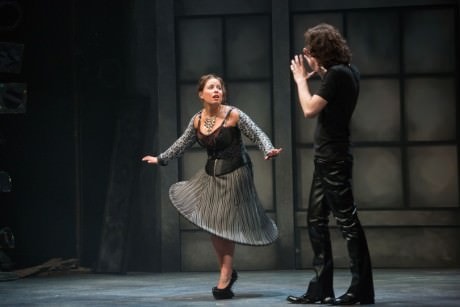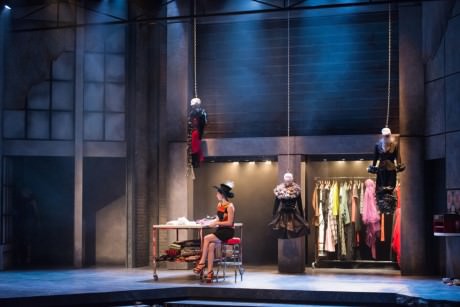Beauty culture is a mess; fashion culture is the messiest, starving the human body, while forcing it into impossibly harsh postures, all in the name of aesthetics: ribs might not be damaged for that 13-inch waist but ankles from those heels—that’s another story. The effects that culture has on the psychology of women in America are worse than the physical torture.
Everything You Touch by Sheila Callaghan, and playing for three more days at the Contemporary American Theatre Festival in Shepherdstown, WV., explores the ravages of that culture. Unfortunately, although Callaghan’s play explores the subjective depths of its resulting neuroses, its objective exterior, its plot and character development are as messy as its theme.

Everything You Touch focuses on Jess, played with pugnacious verve by Dina Thomas, and Jess’s inner monologue is really what Touch is all about.
Jess has self-esteem issues related to the fact that she is the non-model type. Impossibly sweet and short and given to sneaking chocolate and devouring burritos from the middle to the end. Callaghan made her a computer nerd, which might be a bit cliché, but why not: retreat from the world of the body into the pixilated world of viral videos and online chats.
When Jess is not talking to herself, by way of the audience, she’s talking to her fantasy lover, which is really just talking to yourself.
Her real lover, or the man who loves her, is Lewis, another computer person, played loveably by Mark Thomas. We never see the two of them together on stage as he has his own set of monologues delivered to Jess when he calls her via cell phone.
The other central character is Victor, played by the impossibly tall and thin Jerzy Gwiazdowski. Victor is a 1970’s New York fashion designer with a small following; he is all verve and hyperbole and full of himself.
He also happens to become Jess’s fantasy lover, even though Jess lives in 2015 and Victor lives in the early 1970s.

Victor also happens to be quite a bit more than just a fantasy lover, and that’s where Callaghan’s script begins to wobble and ultimately fails.
You see, Jess has a deeply disturbing back story and Callaghan has elected to bring her play and back story to its audience cloaked in mystery, coyly establishing possibilities a bit too far fetched and unexplored for this viewer. For that mystery devise is not organic to the script and its characters’ psychology: it has been imposed by the playwright. Thus, we sit there wondering, why is this fashion designer, whom we only know from the 1970s, suddenly Jess’s fantasy lover in the present day?
Then, when those possibilities come true and the rest of the characters in Callaghan’s play move center stage, they have not been developed sufficiently, or compassionately, enough for us to know them, or even want to know them. We are left with that disturbing back story but without the emotional support to make sense of it.
One of the most important underdeveloped characters is Esme, played with model-ambitiousness by Libby Matthews: she is all New York fashion world, cut throat and fearless, and impossibly in love with, and muse to, her designer Victor.

Like Victor, she turns out to be quite a bit more than the script allows.
Finally, we have Louella, played dynamically by Marianna McClellan. She lives with her Mom in Littlerock, Arkansas, but wins a fashion contest and arrives at Victor’s door step ready for a makeover. She ends up making Victor over in the process.
An ensemble of “models” round out the cast: Molly Brown, Allyson Jean Malandra, Sarah Nealis, Adam H. Phillips, Katya Stepanov, and Liba Vaynberg. Not only do they play models in Victor’s fashion shows, but they also serve, on occasion, as furniture pieces, reminiscent of several photos published online where women were used as chairs and tables.
Director May Adrales does a fine job keeping the script’s diffuse plot lines moving forward but finds no way for them to support each other in any meaningful way.
And then there are those dangling scenes; for example, the suicide of a young model in the play’s opening moments becomes utterly gratuitous, unless one argues that it establishes just how cruel the fashion industry or Victor can be. We hardly need that moment to forecast the coming cruelty.
The design team, led by set designer David M. Barber and costume designer Peggy McKowen, create a decadent, dusty world, with flashes of glamour and spectacle. Projection designer Shawn Duan and lighting designer John Ambrosone contribute color and flash to the spectacle. Unfortunately, like the play itself, chaos is the lasting impression: a postmodern nightmare perhaps, not on the brink of discovery, but impossibly twisted to make room for everything the playwright wants to say.
And that, in the end, is the problem with Everything You Touch. Billed as a dark comedy, Everything You Touch is, in reality, two plays: the “dark” is a play about a narcissistic 1970’s fashion designer and his jilted lover; the “comedy” is about a modern “not thin” thirty-something young woman with body issues who eventually finds a small happiness in New York City.
Mashing those two plays together might create interesting moments of bizarre visuals, but they throw no light on the real cultural issue of beauty industry’s psychological effects on women in 21st century America.
Everything You Touch plays through August 2, 2015, at the Contemporary American Theater Festival performing in the Marinoff Theater – Center for Contemporary Arts/II – 62 West Campus Drive, in Shepherdstown, WV. For tickets, call the box office at (304) 876-3473/(800) 999-2283, or purchase them online.
LINKS
The Playwright’s Playground – The Playmakers CATF 2015: Part 4: Playwright Sheila Callaghan on ‘Everything You Touch’ by Sydney-Chanele Dawkins.
The Playwright’s Playground – The Playmakers CATF 2015: Part 2: Director May Adrales on ‘Everything You Touch‘ by Sydney-Chanele Dawkins.





